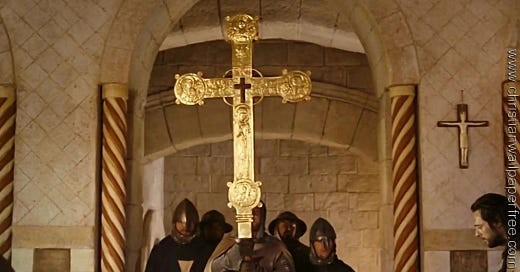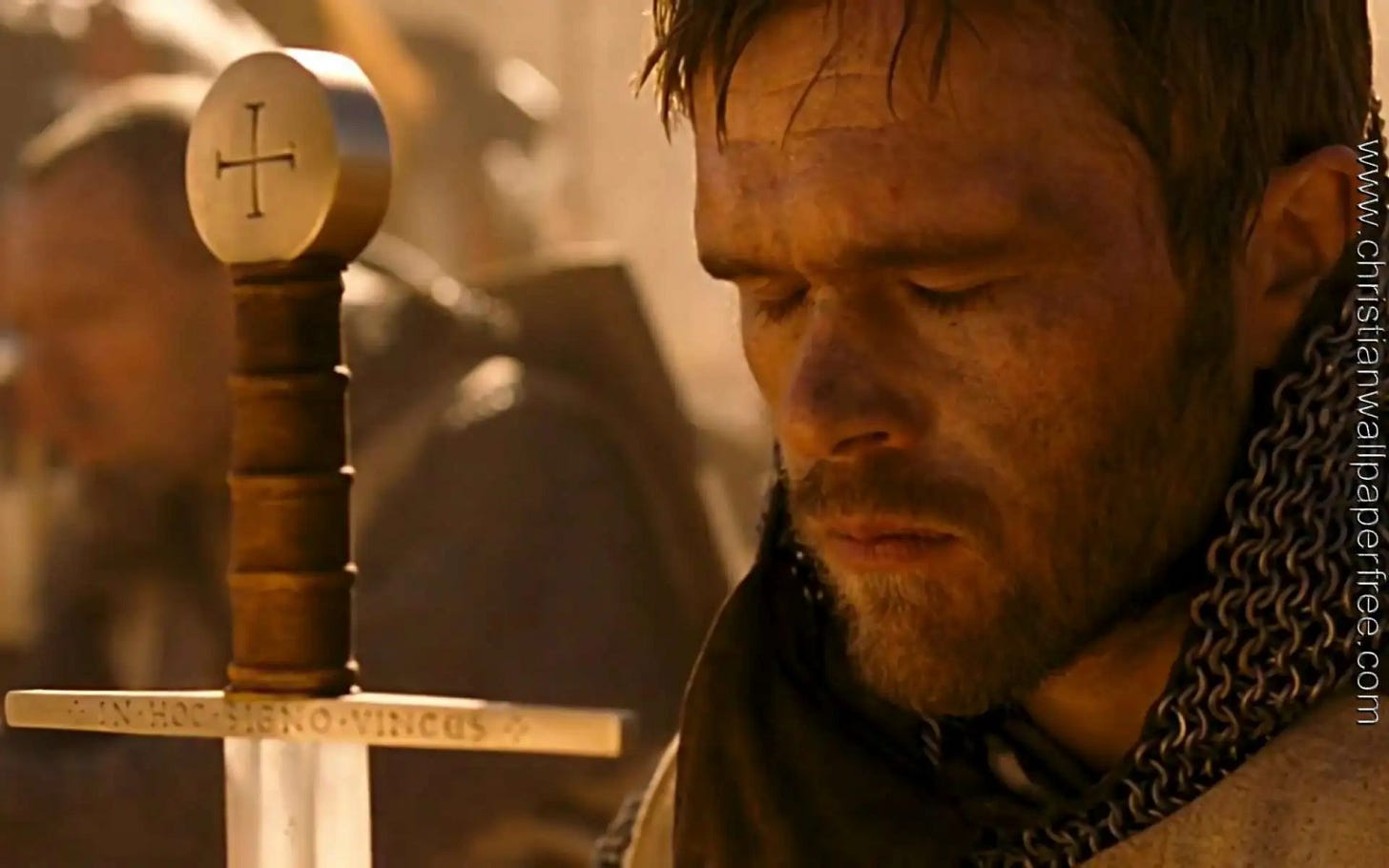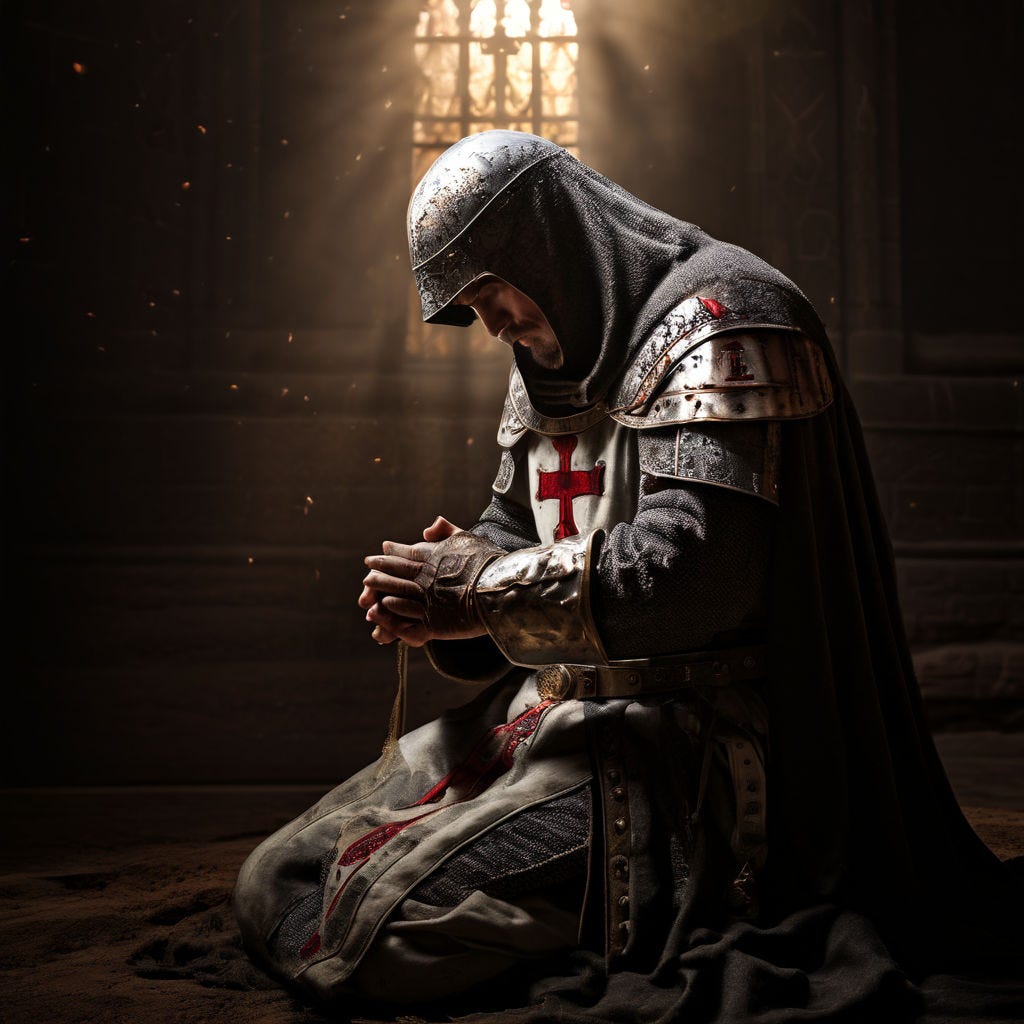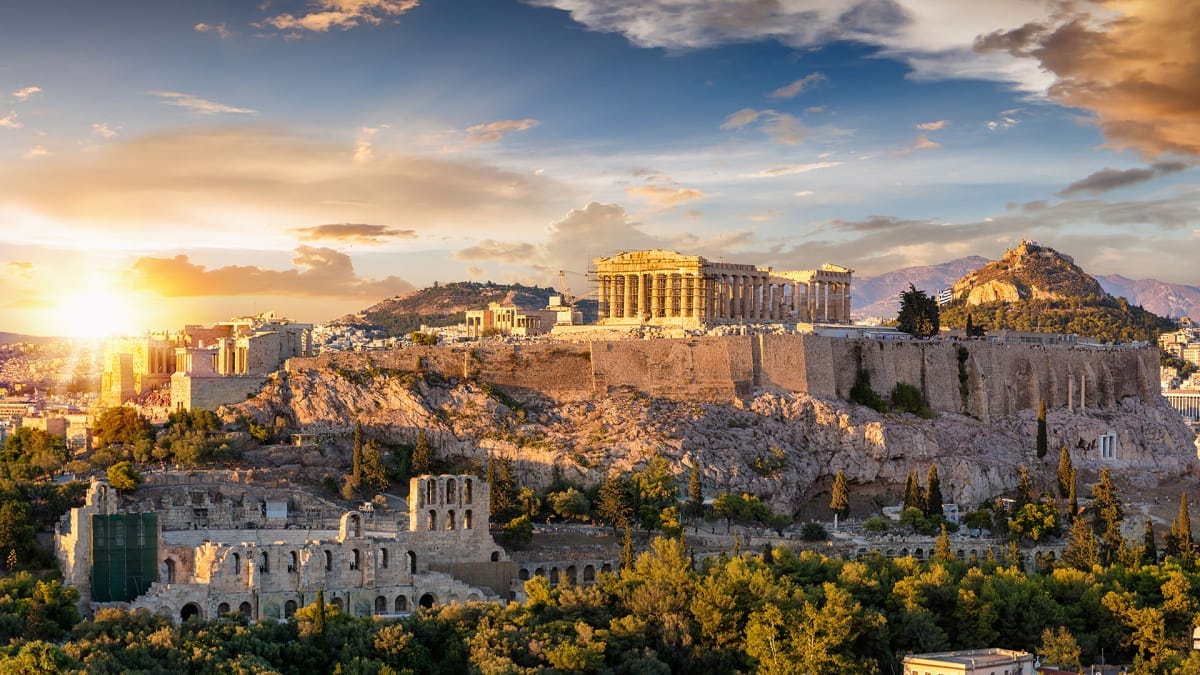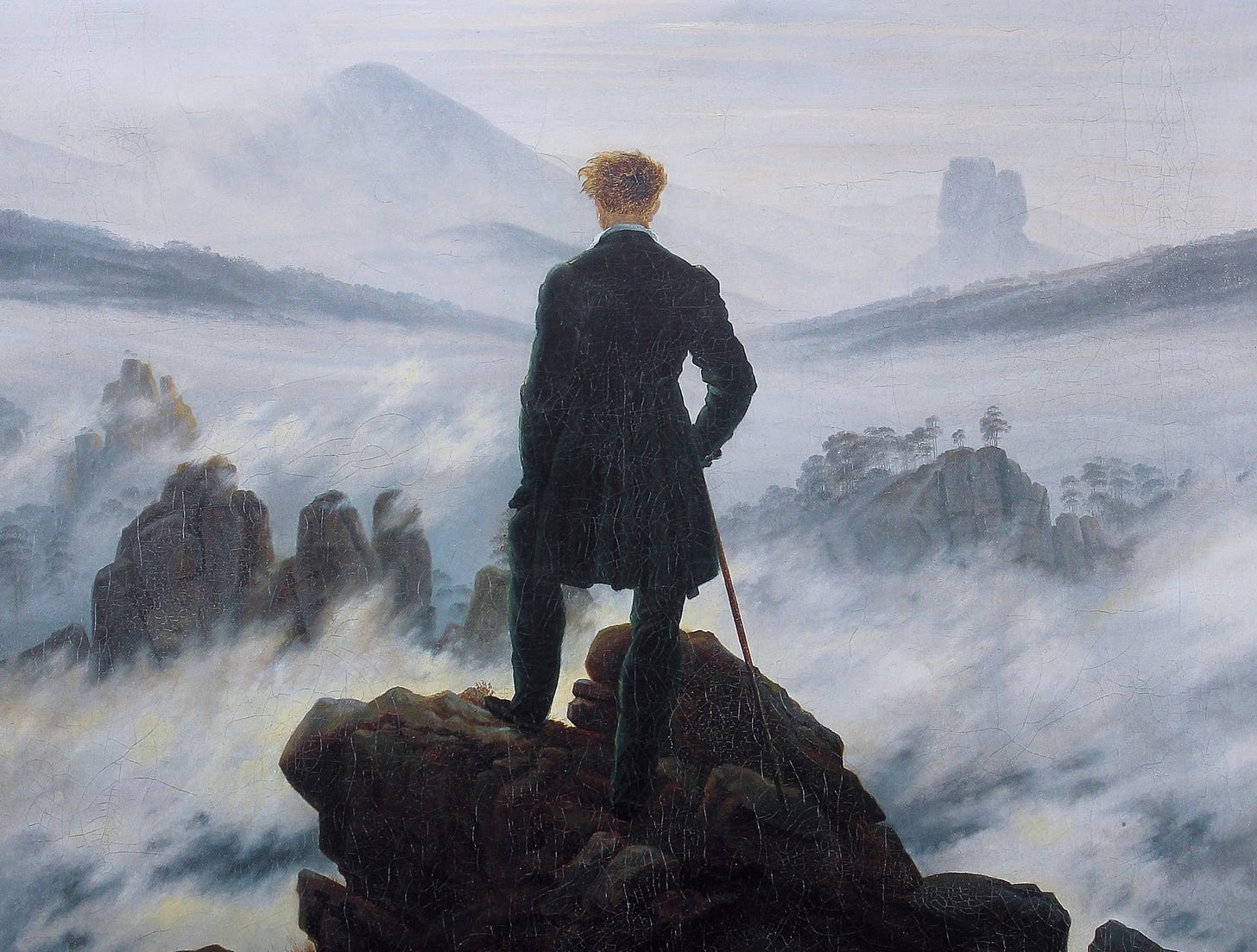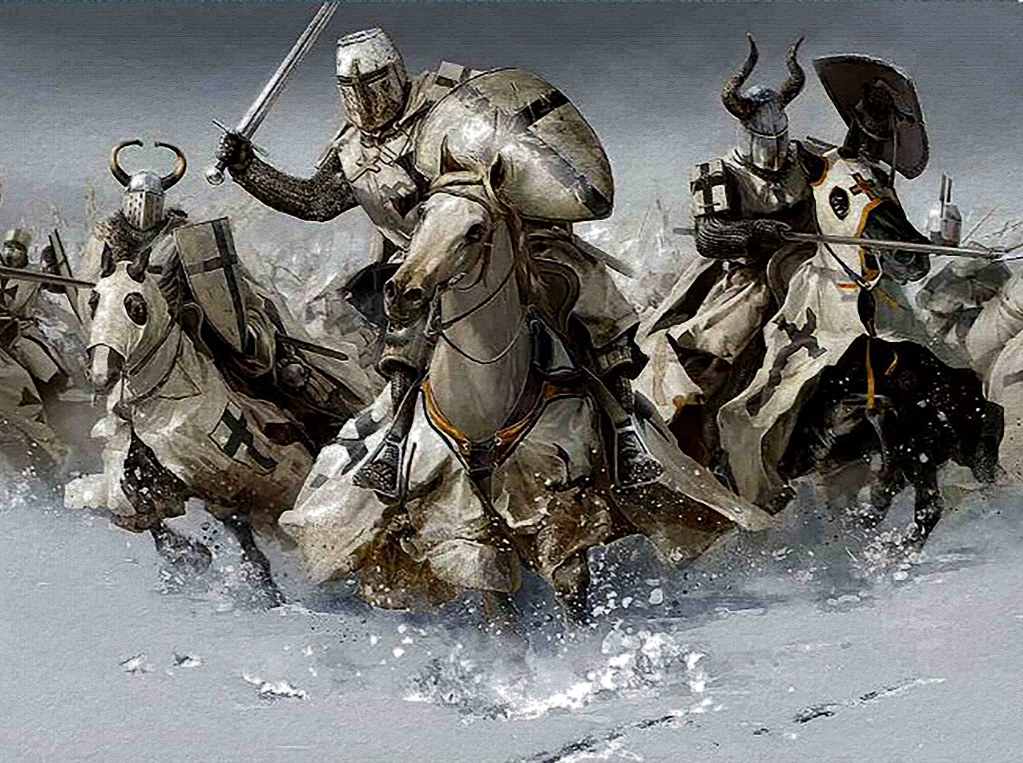Revitalizing the Sacred Spirit of the Templars
In an Age of Decline, We Must Reclaim the Spirit of the Knights Templar to Save Our Nation.
The other day, I revisited a film that deeply resonated with my soul—Arn: The Knight Templar. One scene, in particular, etched itself into my memory. The Grandmaster of the Templar Order convened with his fellow knights, and a solemn silence fell over them as a high-ranking knight entered, bearing a cross with a fragment of sacred wood from the cross of Christ embedded within it. As soon as this emblem of Christ's sacrifice was recognized, every man in the room ceased speaking, turned, and knelt in reverence, crossing themselves with a humility that transcended time.
For Christians and Catholics, this scene is not merely cinematic; it is a reflection of a profound reality that once existed less than a millennium ago. The fragment of the cross, a physical remnant of Christ’s ultimate sacrifice, symbolizes the deepest connection between faith and the warrior spirit. It embodies the greatest sacrifice one can make—bearing the weight of the world and facing death for the salvation of humanity. To the Templars, this was not merely a relic but a living testament to their sacred duty. When they gazed upon this fragment, they saw more than wood; they saw the embodiment of Christ’s suffering and the call to emulate that sacrifice in their own lives.
The Templars, in their devout reverence, did not just honor this relic—they internalized its meaning. They understood that their mission was not merely to fight but to bear their crosses, to suffer in service to Christ and their people. This sense of sacred duty propelled them to embody the warrior spirit with unwavering resolve.
On August 15th, 1096, the First Crusade commenced, altering the course of history forever. While the Crusades themselves are a topic for another essay, this piece is not concerned with debating the righteousness of those wars. Rather, I wish to illuminate the men behind the swords—the Knights Templar—whose lives were a testament to the divine. To understand these warriors is to glimpse a world where the sacred and the martial were inseparably intertwined, where each battle was both a physical struggle and a spiritual quest.
This introduction sets the stage for a deeper exploration of how the Templars’ devotion and warrior ethos continue to inspire and guide us in our own fight for what is sacred.
The Knights Templar
The Poor Fellow-Soldiers of Christ and of the Temple of Solomon—better known as the Knights Templar—were a French military order rooted in the Catholic faith. These men were not ordinary warriors; they were the sons of nobles, kings, and aristocrats. Unlike most warrior classes, composed of peasants and farmers seeking plunder, the Templars were motivated solely by their devotion to God. The Templar Order offered no worldly riches, no spoils of war—only the promise of a brutal death in a distant land. Upon joining, each member swore a vow of poverty and chastity, renouncing the very things modern men pursue with relentless fervor.
Today’s young men spend their weekends swiping through dating apps, hunting for fleeting pleasures in nightclubs, and losing themselves in the hollow pursuit of wealth. The Templars, in stark contrast, had the world at their feet. Born into privilege and surrounded by the most beautiful women in Europe, they could have indulged in every luxury life offered. Yet they chose a different path. They realized that life’s true purpose lay not in satisfying the flesh but in devoting oneself entirely to Christ.
But the Templars were more than just ascetics; they were warriors—fierce and unmatched. Europe had never seen, and perhaps the world has never seen, warriors of their caliber. They fought against overwhelming odds, outnumbered five to one, seven to one, and yet emerged victorious. Their secret? A fearlessness rooted in the profound understanding that death was not the end but a passage to eternal paradise. They gazed upon the edge of the sword with the same reverence they showed the cross, for they knew that to die in battle was to be welcomed into the arms of Christ.
The Crisis of Modern Man
When we gaze upon the state of modern man, a profound shame overwhelms us. Our ancestors, who once walked with divine purpose and unshakable conviction, would scarcely recognize their descendants—disconnected, purposeless, and adrift in a sea of nihilism. The spiritual decay of our age has severed the sacred bond that once linked man to the eternal, leaving behind a husk of what was once a noble being. The divine whisper of God, the transcendent call that once guided men to greatness, is now drowned in the cacophony of the modern world—dulled by the poison of drugs, the emptiness of alcohol, the enslavement of pornography, and the mind-numbing rhythm of nightclubs. The rising tide of despair is undeniable: suicide among young men reaches new heights each year, and the epidemic of loneliness festers in the soul of society. Every sign around us heralds not the dawn of a new era, but the deepening darkness of our time.
In the face of such desolation, with a culture as rotten as ours, a political class as corrupt as any in history, and a society seemingly beyond redemption, many have chosen the path of escape. They flee, not into battle, but into oblivion—seeking refuge in the bottle, in the needle, in death, or in the silent embrace of the forest, far from the madness of the cities.
To fight for “America” or what it once represented may seem a fool's errand, an exercise in futility. Yet, to drown oneself in alcohol or to vanish into the wilderness is no solution. We must turn our gaze not away from the world, but back to our past. In the annals of history, we find not only the blueprint for how to fight but the reason for our struggle.
It is time for the return of the Holy Warrior.
The Kali Yuga: The Dark Age
One of the most insidious fallacies to have ever taken root in the human mind is the concept of evolution—an arrogant belief that humanity is on an inexorable march toward progress. In truth, the history of mankind is not one of ascent, but of descent—a tragic tale of involution, where we began at a higher plane of existence and have since spiraled downward. Today, we stand at the nadir of this descent, in the lowest stage of all: the Kali Yuga, the age of darkness, where all that was once sacred has been desecrated, and all that was noble has been debased. This is an age where our culture no longer deserves preservation but instead calls for a cleansing fire—a fire that will burn away the filth and corruption of modernity without remorse. We are living in a Dark Age, not merely of material circumstances, but of the spirit and soul. This age exalts sin and celebrates spiritual degradation; we dwell amidst the ashes of great civilizations, whose cultural achievements once soared to the heavens, but now crumble under the weight of our own decadence. The so-called “culture” of the modern world leaves behind nothing but filth and debauchery, an abomination to the memory of our forebears.
Those of us who have awakened from the slumber of passive existence stand amidst these ruins, not with despair, but with a righteous fury. Our ancestors are often dismissed with contempt by the arrogant, as if they were blind to truths that we, in our “enlightened” modernity, now grasp. Yet, as René Guénon rightly observed, “The man of Tradition was aware of a dimension of being much wider than what our contemporaries experience and call ‘reality.’” The men of old possessed an understanding of the world far deeper and more profound than we, in our technological hubris, could ever fathom. Those who lived in the Middle Ages, or at the zenith of the Roman Empire, inhabited a culture far superior to our own, for they recognized that the material world was but a reflection of a higher spiritual order. The knightly orders of the medieval period, the Holy Templars and Teutonic Knights, along with the early Roman elites, possessed a quality of soul that our modern minds, enslaved by the material, can scarcely comprehend.
The Warrior Class
To reclaim our lost greatness, we must resurrect the values and way of life of those who came before us, who built the great civilizations of old. Let us begin with a reflection on the foundation of society itself, from the dawn of time until the calamity of the French Revolution. Almost without exception, the great civilizations were established by conquerors—warrior-pastoralists who subdued the agricultural societies of their time. This pattern repeats throughout history, from the Mesopotamians, Romans, and Greeks to the Persians and Chinese. Take China, for example: for most of its history, the native Han was ruled by foreign powers, often the nomadic warriors of the steppe. The only era in which the native Chinese ruled themselves was during the Ming Dynasty; otherwise, they were governed by the Jurchen, Manchu, or Mongol armies.
This pattern is universal. Agricultural societies, with their sedentary ways, were less fit and less prepared for war than the warrior nomads who conquered them. The warriors, by virtue of their superiority in battle, became the rulers, forming an aristocracy. Above them stood only the priestly class, creating a hierarchy that endured for millennia: the priestly caste at the top, followed by the warrior nobility, who often elected the king or ruler, then the mercantile class (wealthy businessmen and traders), the farmers, and finally, at the bottom, the peasants.
Freed from the burden of daily survival, the warrior class had the time and resources to cultivate knowledge and create art. Athens is the quintessential example of this—a small city-state whose influence on humanity transcends the ages.
But today, the warrior class is no more. Our men are no longer warriors but have become effeminate cowards, spiritually castrated by the comforts of modernity. Many share our belief that we live in a dark age, yet they lack the courage to rise and fight. Those who rule over us today are not noble aristocrats but bourgeois politicians, devoid of courage and honor. These are men who would sell their people for thirty pieces of silver, who would capitulate at the first sign of opposition.
This stands in stark contrast to the warrior aristocrats of traditional societies, who were guided not by materialistic desires but by a spiritual mandate to “please the Gods.” Yet, not all past warrior classes are worthy of emulation. While Genghis Khan was a warrior of unparalleled ferocity, he was also a destroyer of civilizations. But throughout history, there have been noble warrior classes, none more revered than the Holy Knights Templar. These warriors fought not for gold or power, but for God. As sons of kings and nobles, they ruled with the highest moral standards, protecting the traditions of their ancestors with unparalleled zeal. They were an elite, not in wealth or power, but in moral superiority. They ruled with a gentle hand toward the righteous and a firm sword against the wicked, earning the fear and respect of their enemies. To this day, they are remembered as heroic soldiers of God.
The Return of the Holy Warrior
When the world faced its darkest hours, the Knights Templar vanished. Today, we face a similar crisis and call for the resurgence of the Holy Warriors—our modern-day Templars. We are at war—not only for our souls but against the very essence of modernity. To confront this challenge, we must revive the spirit of the Holy Warrior within our men, forging an organized brotherhood to wrest power from the decadent elites who rule us. What we need is, as Vilfredo Pareto coined, a Counter-Elite. But this Counter-Elite must not be composed of wealthy individuals flaunting material wealth; it must be an elite of men who are morally superior, guided by an unshakable warrior ethos. A modern example might be Otto von Bismarck, the Iron Chancellor, whose will and resolve forged a new order in Europe. The elites of today must aspire to be more than mere rulers—they must be symbols, living embodiments of values and ideals that inspire the masses to reclaim their destiny.
This Counter-Elite must seize power from those who wield it for evil and degeneracy. We need an elite oriented not toward the fleeting pleasures of the material world but toward the eternal truths of God. These elites must embody the essence of the “Holy Warrior.”
The Templar Order was founded by noblemen of France, and its recruits came from the wealthiest families in Rome, Paris, and London. But in our time, one need not be born of noble blood to join the ranks of the Holy Warriors. What made these warriors holy was not their lineage but the life they led and the fearlessness with which they faced the world. The elites of this new age can no longer afford to be the shameful leaders we see today. We must rise above the society we inhabit.
As we stand amidst the ruins of great civilizations, let us not despair. Instead, let us rise and fight. Here’s how we can begin embodying the Holy Warrior ethos:
Commit to Personal Integrity: Adopt a code of honor rooted in truth and moral courage, and let this guide every decision you make.
Pursue Excellence: Dedicate yourself to personal and professional greatness, setting high standards for yourself and those around you.
Forge Strong Brotherhoods: Build and nurture networks of like-minded individuals who share your values, offering mutual support and solidarity.
Engage in Public Discourse: Challenge and confront prevailing ideologies that undermine our values, using your voice and actions to advocate for traditional principles.
Act with Courage: Stand resolutely in your beliefs, taking bold actions to protect what is sacred and work toward a better future.
We must revolt against the filth, violence, and degeneracy that have enveloped our world and reclaim what is rightfully ours. We are the new Templars, destined to build a new order upon the ashes of the old. To those who have opened their eyes and seen the devastation modernity has wrought upon our world, I say this: we do not belong here. We who have the vision to see the true nature of our age are strangers in a blind world. But our battle is not merely for our people and traditions; it is for all of humanity. We must carve out a new path, stand firm against the forces seeking to destroy all that is sacred and lead the charge for a better world.
The Stranger of Wells’ Tale
Like many of you, the prospect of making this great leap might seem daunting. We are not merely advocating for voting or debating but for fighting back fearlessly, as the Knights Templar did over a thousand years ago. This challenge is not solely about personal commitment; it involves confronting the backlash for holding steadfast, uncompromising beliefs and revolting against the modern world.
To illustrate our position, I want to end with a famous allegory known as "The Stranger of Wells." Decades ago, a traveler visited a village in South America where the inhabitants had lost their sight generations ago and had forgotten what it was to see. The stranger, who could see, attempted to explain their plight and teach them about sight. The villagers, believing the stranger to be mad, assumed the issue lay in the strange gaps in his skull and resolved to perform a Sinister Operation to remove his eyes. Before they could capture him, the stranger fled to a mountain peak overlooking the valley of the blind. From there, he observed the villagers' futile search for him, and he smiled with contempt and bemusement.
The Stranger of Wells’ Tale is a testament to us. We, who have become alienated from our people, who have made ourselves outsiders, are seen as outrageously deluded by both the left-wing and right-wing establishments. We are pariahs, men beyond the pale. The Sinister Operation, the evil surgery that we refused was to conform. To follow the crowd. To accept the false ideologies, the myths of the 20th century. The truth is, we who have opened our eyes, who have seen the great devastation modernity has wrought upon our world, do not belong here. We no longer belong in a world filled with sin, violence, and debauchery. We are the strangers in a blind world. But our battle is not just for our people and our traditions, but for all humanity. We have the power to revolt against the modern world, to carve out a path forward. The men of this time, and the elites of today, must stand up and fight against the forces that seek to destroy our world. We must never succumb to fear. For what we are about to embark on is not just a battle for our souls, but a battle for the world.
In this endeavor, let us draw inspiration from the Knights in the movie Arn: The Knight Templar. These knights dedicated their lives to fighting for God and God's people with unwavering resolve and courage. Their commitment to a higher purpose, despite the adversities they faced, should be our guiding light. We, too, must stand firm against the forces that seek to dismantle our world, never succumbing to fear. What we are about to embark on is not just a battle for our souls but a battle for the very essence of humanity.
Let us be like those knights—dedicated, fearless, and unwavering in our fight for the sacred and the divine.

